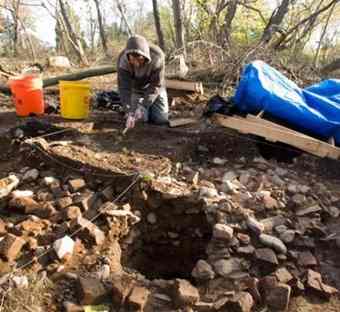Centreville resident Karen Schweikart started her Saturday morning by digging up some history.
 Bent over a shallow pit, armed with a garden trowel and metal dust pan, Schweikart performed the slow and meticulous task of archeology, helping exhume what remains of a colonial era building which could tell historians more about the port town of Colchester.
Bent over a shallow pit, armed with a garden trowel and metal dust pan, Schweikart performed the slow and meticulous task of archeology, helping exhume what remains of a colonial era building which could tell historians more about the port town of Colchester.
"It's fun to be out here with people who love history as much as we do," said Schweikart, one of several volunteers from in and around Fairfax County who visit the site located on the Occoquan River in Fairfax County.
Colchester, chartered in 1753, was once a bustling port where tobacco planters from southern plantations would bring their tobacco for export to England. Later on, wheat and other commodities were shipped from the port.
Capt. John Smith is believed to have visited the site in 1608 when he explored the Occoquan River, encountering several Native Indian groups, according to historians leading the Colchester site efforts.
"This would have been one of the hubs [for tobacco shipment]," said Christopher Sperling, historic field director for the site. "Tobacco was the lifeblood of the Virginia colony. We're finding aspects of what was used early on in the colonial port town."
Colchester began to fail as a port town when an alternate postal route over a new bridge upstream was laid in 1805, according to the historical marker at the site. Additionally, neighboring ports such as Alexandria and Baltimore took business away from Colchester. A fire in 1815 also contributed to its decline.
Since breaking ground in October, the volunteers and county archaeologists have found pieces of pottery, bricks and other remnants from the bygone era.
"What I'm really interested in is the development of trade in this port during this time period," Sperling said. From digging, archaeologists and historians gain a perspective not included in written accounts of life 200 years ago, he said. All too often, the dominant voices are those of white men, leaving out the voices of women, blacks and Native Americans.
"We have this image of tobacco ports, with these ships coming in, with their masts and these men with grand clothes. But who's loading these ships? It's the slaves," he said. Under the caved-in brick structure being unearthed by volunteers is believed to be a colonial storage cellar, which could have some new clues about life during this time.
"I use this example of visiting someone's parlor. It's nice, things are on display. It shows the best of things," Sperling said. "But if you go through the trash, that's the real day-to-day life."
Volunteers on Saturday were finding history about a foot deep in the earth.
"There are a lot of artifacts out here. It's great," said Schweikart, who volunteers with the Archeological Society of Virginia's Northern Virginia chapter. "Some sites, you don't find stuff very often."
"We knew this was a really pristine site so we were excited to get out here," said fellow volunteer Jackie Cuyler of Culpeper said. "We love it."
The site is owned and run by the Fairfax County Park Authority, which purchased the 135-acre lot in April 2007 for $9.52 million -- paid for by bond money, according to authority spokesman Matthew Kaiser.
"The county had the foresight to realize if this area was allowed to be developed, we could lose this history," Sperling said. The key difference between this sight and others he has worked on, he added, is that "because it's not threatened [by pending development], I can take my time and do the best work I can."
County historical archeologist Aimee Wells said she and other archaeologists have been doing archeology in Fairfax County for 30 years as part of the county's development process.
Fairfax is among the few Virginia jurisdictions -- including Alexandria, Richmond and Loudoun -- with archeological teams.
"There's nothing at this scale going on in the county," she said. "Fairfax County is being proactive in protecting these cultural resources.
"This is just the beginning. The big unveiling will be how we interpret the findings" of the dig.
Sperling said digging at the site is heavily assisted by volunteers.
"We take volunteers of every skill level," he said. Those who want to dig can contact Sperling at ColchesterArcheology@fairfaxcounty.gov
An open house is set for 1 to 4 p.m. Dec. 4 at Old Colchester Park and Preserve. Visitors will be able to ask questions about the history of the area, as well as get more information about the current projects there.
For more information visit the park authority website at http://www.fairfaxcounty.gov/parks/news.htm
Author: Holly Hobbs | Source: Fairfax Times [November 23, 2010]





